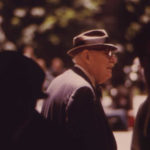We run our website the way we wished the whole internet worked: we provide high quality original content with no ads. We are funded solely by your direct support. Please consider supporting this project.

Angels and Spirits in a Secular World
This week, we’ve been thinking about why we should believe in a spiritual realm in a world shaped by secular thought. One argument that supports the belief that spirits are real is the oldest, most venerable, and most popular argument for this belief in the western intellectual tradition. In essence the argument runs as follows: Throughout all of nature we observe a continuum of life forms leading up to humans. There seem to be no major gaps in the gradation of levels of power, intelligence and personality between us and the lowest form of inorganic life. Now if this much is true of life forms leading up to humans, the argument goes, why think it is not true of life forms leading up from humans? Why think the continuum stops with us?
According to this argument, it is irrational, counter-intuitive, and anthropocentric to suppose that the continuum does stop with us. We should rather suppose that “above us” there is a continuum of life forms leading up to the One who is life itself. In traditional Christian thought this realm between us and God was conceived of as the domain of angels. It has been suggested that the preoccupation with the possibility of extra-terrestrial life forms in our own day is simply a secularized technological version of this same ancient intuition and process of reasoning.
It is difficult to dismiss this line of argumentation as outmoded, for a good deal of science is predicated on precisely the kind of logic this argument employs. As Benedict Ashley notes.
[O]ne of the modes of creative thinking that has paid off richly in science…is extrapolation or pattern thinking. For example, Mendelejeff’s periodic table was based on symmetrical arrangement of known elements according to their properties, but it contained blanks. Eventually it was possible to fill in these blanks by the discovery of new elements. Again, the table of possible kinds of crystalline structures was first worked out mathematically from known types and the blanks were eventually all filled by new discoveries. Our evolutionary view of the world presents us with a great variety of kinds of primary units from atoms to the most complex of living forms. We are always looking for “missing links” to complete this pattern….
He then goes on to apply it to the argument at hand.
Therefore, when we discover that in our visible universe there is a type of organism, the human species, which introduces a wholly new principle of behavior, namely abstract, symbolically expressed, creative thought, we naturally conjecture that the very limited exemplification of this type of life found only in the single human species cannot be the only one. If we also accept that the world has been created by a God who is an infinite intelligence, we are even more struck by the immense gap that lies between these two extremes of mental power, the human and the divine … (Theologies of the Body, ch.13)
On this basis it can be argued that the supposition that there exists spiritual intelligences and powers that fill in the “gap” between us humans and the supreme intelligence and power is a rational supposition.
Some will of course respond to this argument by insisting that the continuum of life forms leading up to us is simply the result of chance evolution. There are no major “gaps” between us and life forms below us because we evolved step by step from them. And since we humans happen to be the most highly evolved form of the life on this planet it is unwarranted to try to postulate any continuum above us on this basis. In other words, while chance got us humans here by means of the ladder of evolution, there’s no reason to suppose that it leads anywhere beyond us.
Three things may be said. First, it must be conceded that this argument loses most of its force if one does not believe in a supreme intelligence, and thus does not see an immense gap between us and God. The reasonableness of this argument admittedly depends a good deal on the reasonableness of believing in God. And so, this argument will naturally have a greater appeal to a theist than to a non-theist. Secondly, the view that evolution has proceeded by means of purely natural chance processes has thus far proven difficult, if not impossible, to demonstrate scientifically. The objection has no more force than does the purely naturalistic theory of evolution—which, to many of us, is close to zero. Third, even if one does hold that we evolved by chance, Ashely’s argument that it is reasonable to assume that we are not the only instance or kind of being in the cosmos that is like us yet stands. One would still be justified in attempting to extrapolate from human characteristics to look for other human-like forms of life, physical (as with extra-terrestrials) and otherwise (as with angels).
Photo credit: Simeon Muller via Unsplash
Category: General
Tags: Angels, Demons, Spiritual Warfare
Topics: Spiritual Warfare, Cosmic Conflict
Related Reading

Does God Inflict Physical Disabilities?
In Exodus 4, we find Moses claiming that he could not be used by Yahweh to get the children of Israel out of Egypt because he was “slow of speech and tongue.” To this Yahweh replies, “Who gave human beings their mouths? Who makes them deaf or mute? Who gives them sight or makes them…

On Obedience as Spiritual Warfare (podcast)
In this episode Greg talks about the role of obedience in Spiritual Warfare. Episode 33 http://traffic.libsyn.com/askgregboyd/Episode_0033.mp3

That Weird Episode with the Pigs
In my opinion, the single strangest episode recounted in the Gospels is the account of Jesus’ encounter with a demonized man that ended with two thousand pigs drowning themselves in the Sea of Galilee (Mk 5:1-10//Mt 8:28-34; Lk 8:26-39). Some find it morally objectionable that this mass suicide was the result of Jesus allowing the…

In the Face of Blueprint Words
Many of you know Jessica Kelley through the posts we’ve featured about her on the ReKnew site. She is someone we’ve come to love very much. Jessica lost her five year old son Henry to cancer and has since begun writing a book about her journey. We can’t wait until it’s published. While Greg has…

Can a Christian be demonized?
I along with most evangelical scholars and pastors do not believe it possible for a Christian to be “possessed” by a demon or by Satan. Christ in principle defeated Satan, and all who are “in Christ” share in this victory (e.g., John 12:31; Col. 2:13–15; 2 Thess. 3:3; Heb. 2:14–15; 1 John 5:18). Colossians 1:13…

Can Christians be Demon Possessed?
The Greek word that is usually translated “demon-possessed” in the Gospels is demonizomai, which literally means “to be rendered passive toward a demon.” It’s unfortunate, in my view, that the term is usually translated “demon possession.” “Possession” implies complete ownership whereas the concept of being rendered passive toward a demon can be reflective of many degrees…
